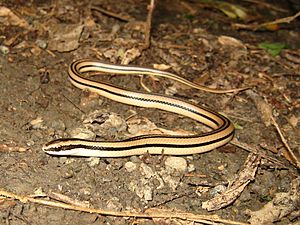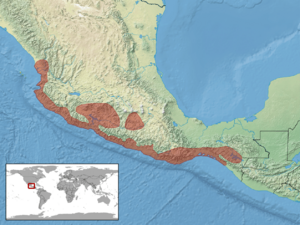Striped road guarder facts for kids
Quick facts for kids Striped road guarder |
|
|---|---|
 |
|
| A striped road guarder snake | |
| Conservation status | |
| Scientific classification |
|
| Kingdom: | Animalia |
| Phylum: | Chordata |
| Class: | Reptilia |
| Order: | Squamata |
| Suborder: | Serpentes |
| Family: | Colubridae |
| Genus: | Conophis |
| Species: |
C. vittatus
|
| Binomial name | |
| Conophis vittatus Peters, 1860
|
|
 |
|
| Script error: The function "autoWithCaption" does not exist. | |
Script error: No such module "Check for conflicting parameters".
The Conophis vittatus, also known as the striped road guarder, is a type of snake. It belongs to the family called Colubridae. This snake is found naturally in Mexico and Guatemala.
Contents
About the Striped Road Guarder
The striped road guarder is a fascinating snake. It gets its name from the stripes on its body. These snakes are often seen near roads, which is why they are called "road guarders." They play an important role in their natural environment.
What it Looks Like
The striped road guarder has a slender body. It usually has distinct stripes running along its length. These stripes can be different shades of brown, tan, or even reddish. The patterns help the snake blend in with its surroundings. This camouflage keeps it safe from predators.
Where it Lives
This snake lives in parts of Central America. You can find it in Mexico and Guatemala. It prefers areas with lots of vegetation. This includes forests, grasslands, and even agricultural fields. They are often found on the ground, hiding among leaves or rocks.
What it Eats
The striped road guarder is a predator. It hunts small animals for food. Its diet mainly includes lizards, frogs, and small rodents. Sometimes, it might also eat other small snakes. They use their keen senses to find their prey.
How it Behaves
These snakes are mostly active during the day. They are known to be quite quick. When they feel threatened, they might try to escape quickly. They are generally shy and prefer to avoid humans. Like many snakes, they help control populations of pests.
Life Cycle and Reproduction
Striped road guarders reproduce by laying eggs. The female snake will find a safe place to lay her eggs. This could be under rocks or in decaying logs. The eggs hatch after a period of time. Young snakes are born small and must learn to hunt on their own. They grow bigger over time, shedding their skin as they get larger.
See also
 In Spanish: Culebra guardacaminos rayada para niños
In Spanish: Culebra guardacaminos rayada para niños
 | Aurelia Browder |
 | Nannie Helen Burroughs |
 | Michelle Alexander |


